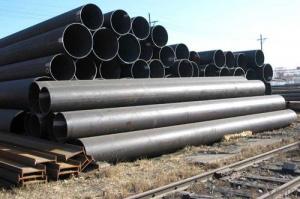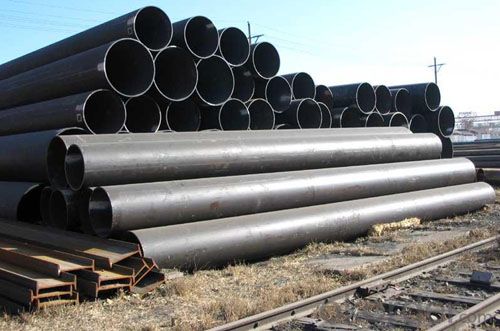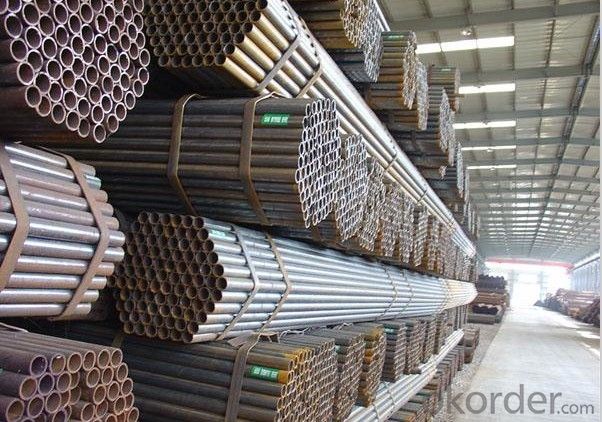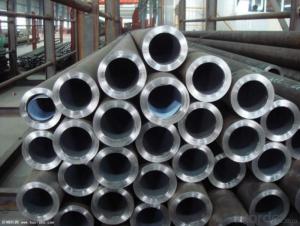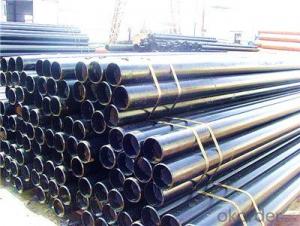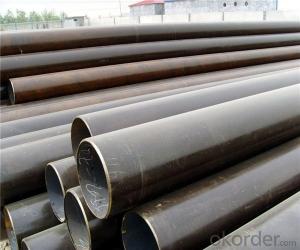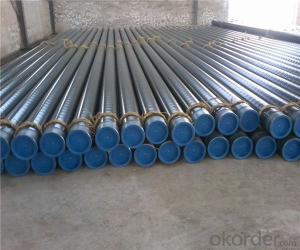Carbon Steamless Steel Pipe For Sale With Large Quantity
- Loading Port:
- Tianjin
- Payment Terms:
- TT or LC
- Min Order Qty:
- 20 m.t.
- Supply Capability:
- 450 m.t./month
OKorder Service Pledge
OKorder Financial Service
You Might Also Like
1、Structure of Seamless Pipe ASTM A106/53:
Seamless pipe is formed by drawing a solid billet over a piercing rod to create the hollow shell. As the manufacturing process does not include any welding, seamless pipes are perceived to be stronger and more reliable. Historically seamless pipe was regarded as withstanding pressure better than other types, and was often more easily available than welded pipe.
Quick Details
| Special Pipe: | Thick Wall Pipe | Alloy Or Not: | Non-alloy | Standard: | API 5L,API |
Seamless Steel Pipe
Standard:API ASTM DIN
Size:OD:21.3mm-609.6mm
WT:1mm-40mm
Mechanical properties
standard | grade | Tensile strength(MPA) | yield strength(MPA) |
ASTM A106 | A | ≥330 | ≥205 |
B | ≥415 | ≥240 | |
C | ≥485 | ≥275 |
2、Main Features of the Seamless Pipe ASTM A106/53:
• High manufacturing accuracy
• High strength
• Small inertia resistance
• Strong heat dissipation ability
• Good visual effect
• Reasonable price
3、Seamless Pipe ASTM A106/53 Specification:
Standard | GB, DIN, ASTM ASTM A106-2006, ASTM A53-2007 |
Grade | 10#-45#, 16Mn 10#, 20#, 45#, 16Mn |
Thickness | 8 - 33 mm |
Section Shape | Round |
Outer Diameter | 133 - 219 mm |
Place of Origin | Shandong, China (Mainland) |
Secondary Or Not | Non-secondary |
Application | Hydraulic Pipe |
Technique | Cold Drawn |
Certification | API |
Surface Treatment | factory state or painted black |
Special Pipe | API Pipe |
Alloy Or Not | Non-alloy |
Length | 5-12M |
Outer Diameter | 21.3-610mm |
Grade | 20#, 45#, Q345, API J55, API K55, API L80, API N80, API P110, A53B |
Standard | ASME, ASTM |
4、Packaging & Delivery
Packaging Details: | seaworthy package,bundles wrapped with strong steel strip |
Delivery Detail: | 15-30days after received 30%TT |
5、FAQ of Seamless Pipe ASTM A106/53:
①How is the quality of your products?
Our products are manufactured strictly according to national and internaional standard, and we take a test
on every pipe before delivered out. If you want see our quality certifications and all kinds of testing report, please just ask us for it.
Guaranteed: If products’ quality don’t accord to discription as we give or the promise before you place order, we promise 100% refund.
②How about price?
Yes, we are factory and be able to give you lowest price below market one, and we have a policy that “ for saving time and absolutely honest business attitude, we quote as lowest as possible for any customer, and discount can be given according to quantity”,if you like bargain and factory price is not low enough as you think, just don’t waste your time.Please trust the quotation we would give you, it is professional one.
③Why should you chose us?
Chose happens because of quality, then price, We can give you both.Additionally, we can also offer professional products inquiry, products knowledge train(for agents), smooth goods delivery, exellent customer solution proposals.Our service formula: good quality+good price+good service=customer’s trust
SGS test is available, customer inspection before shipping is welcome, third party inspection is no problem.
6、Seamless Pipe ASTM A106/53 Images:
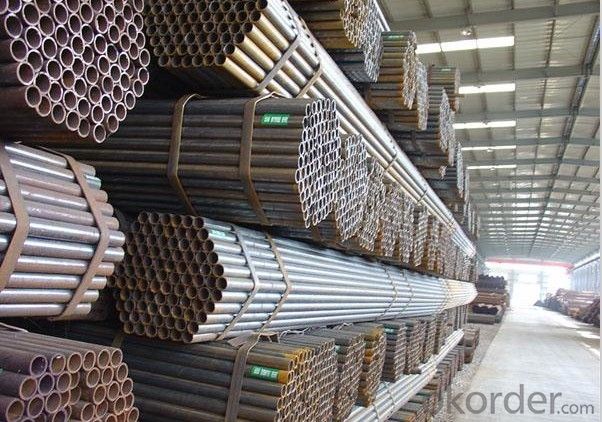
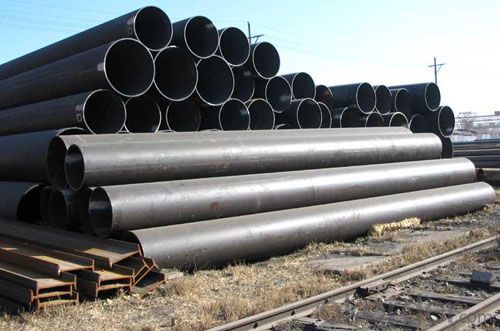
- Q: Can steel pipes be used for chemical refineries?
- Chemical refineries can utilize steel pipes for their operations. Steel pipes are frequently employed in chemical refineries because of their exceptional strength, long-lasting nature, and resistance to corrosion. Given the harsh conditions present in a chemical refinery, including exposure to corrosive chemicals and extreme temperatures, it is necessary to employ materials that can endure such circumstances. Steel pipes possess the capability to withstand these challenges and are often preferred for their ability to securely and efficiently transport diverse fluids and gases. Furthermore, the weldability of steel pipes permits easy installation and maintenance within intricate refinery systems. All in all, steel pipes are a fitting choice for chemical refineries due to their durability, ability to resist corrosion, and compatibility with the demanding conditions encountered in this industry.
- Q: Does seamless steel tube have a bend of 135 degrees?
- In engineering, it is usually marked as "45 elbow" and has no "135" mark. The angle of the elbow is acute, so there will be no more than 90 degrees elbow.
- Q: Can steel pipes be used for structural supports?
- Yes, steel pipes can be used for structural supports. Steel pipes are strong, durable, and have high load-bearing capacity, making them suitable for providing structural support in various applications such as buildings, bridges, and infrastructure projects.
- Q: Is the PVC tube a plastic tube or a plastic tube?.
- It's plastic tubePolyvinyl chloride (Poly, Vinyl, Chloride, PVC)PVC is a VCM monomer (vinyl, chloride, monomer), in peroxide, azo compounds and other initiators;
- Q: How are steel pipes coated for aesthetic purposes?
- Steel pipes can be coated for aesthetic purposes through various methods such as painting, powder coating, or using decorative finishes like chrome plating. These coatings not only enhance the appearance of the steel pipes but also provide protection against corrosion and increase their durability.
- Q: What is DN50 for welded pipe?
- Refers to the use of welded steel pipe made of DN50 steel pipe, refers to the inside diameter is 50mm, the market of common DN50 pipe also refers to the 2 inch pipe, standard pipe: 3.5mm thickness, pipe diameter 60mm, the weight of 4.88kg/m theory. DN50 seamless steel pipe, commonly used in the market, has two specifications: 57mm, 60mm, and if no special instructions, 57mm is commonly used. The outer diameter of the welded pipe is only 60mm this specification.
- Q: What are the common problems or issues faced with steel pipes?
- Common problems or issues faced with steel pipes include corrosion, leakage, cracking, and scaling. Corrosion can occur due to exposure to moisture, chemicals, or environmental factors, leading to reduced structural integrity and potential leaks. Leakage can result from faulty welds, damaged seals, or pipe degradation. Cracking can occur due to excessive stress, temperature fluctuations, or manufacturing defects, compromising the pipe's strength. Scaling or buildup of mineral deposits can also restrict flow and affect performance. Regular inspection, maintenance, and proper coating or lining can help mitigate these issues.
- Q: How are steel pipes used in industrial manufacturing processes?
- Steel pipes are commonly used in industrial manufacturing processes for various purposes such as transporting fluids, gases, and solids, as well as providing structural support. They are used in industries like oil and gas, construction, automotive, and chemical manufacturing. Steel pipes offer high durability, strength, and resistance to corrosion, making them ideal for handling harsh environments and high-pressure applications. Additionally, they can be easily welded, bent, and manipulated to fit specific requirements, allowing for efficient and cost-effective installations.
- Q: Seamless steel tube with the tube with what is the difference?
- Seamless steel tube is integrally formed with welded steel pipe steel plate butt welding and welding seam.
- Q: How are steel pipes protected against external mechanical damage?
- Steel pipes are protected against external mechanical damage through various methods. One common method is the use of protective coatings. These coatings provide a physical barrier between the steel surface and external forces, such as impact or abrasion. Coatings can be applied through processes like painting, epoxy coating, or wrapping the pipe with materials like polyethylene or polypropylene. Another method of protection is the use of external casing or encasement. Casing pipes are installed around the steel pipes to provide an additional layer of protection. These casing pipes are typically made of materials like concrete, PVC, or ductile iron, which are resistant to external mechanical damage. Furthermore, steel pipes can be protected by using supports and restraints. Properly designed supports and restraints help to distribute external forces evenly and prevent excessive stress or deformation on the pipe. This includes using hangers, clamps, or brackets to secure the pipe in place and minimize the risk of mechanical damage. In addition, steel pipes can be protected by implementing measures to prevent accidental impacts or collisions. This can involve installing protective barriers, fencing, or warning signs to alert people to the presence of pipelines and prevent unintentional damage. Overall, a combination of protective coatings, casing, supports, and preventive measures is utilized to ensure that steel pipes are safeguarded against external mechanical damage. These measures help to maintain the structural integrity of the pipes and ensure their long-term performance and reliability.
Send your message to us
Carbon Steamless Steel Pipe For Sale With Large Quantity
- Loading Port:
- Tianjin
- Payment Terms:
- TT or LC
- Min Order Qty:
- 20 m.t.
- Supply Capability:
- 450 m.t./month
OKorder Service Pledge
OKorder Financial Service
Similar products
Hot products
Hot Searches
Related keywords
